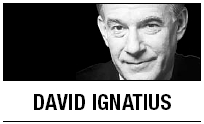WASHINGTON ― With his much-ballyhooed speech on the Middle East, President Obama set himself a challenge that can be summarized in two words: Follow through.

Obama spoke with more clarity than some analysts had expected about the two most incendiary issues in the region right now: President Bashar al-Assad’s violent suppression of protests in Syria, and the risk of a new Palestinian explosion if a serious peace process can’t be restarted.
On both issues, Obama’s answers avoided the conventional wisdom of the day (or rather, yesterday). Instead of offering a quick and easy rhetorical condemnation of Assad, Obama called on him to enact specific reforms (as Assad has claimed he wanted) or leave office; and rather than acceding to Israeli desires to lowball the Palestinian issue, Obama insisted on the need for negotiations and stated some “principles” to guide them.
The Syria passage of the speech offered a blueprint for what Assad must do to survive: “stop shooting demonstrators,” “release political prisoners,” “allow human-rights monitors to have access” to Daraa and other besieged cities, and open “serious dialogue” with the opposition about a democratic transition. Assad probably can’t fulfill that list (which would require him to break from Iran) but it’s worth one last try before the deluge. Who will carry the message to Damascus? Unfortunately, not clear.
On the Israeli-Palestinian front, Obama edged toward what he should have done two years ago ― frame parameters to guide negotiations. He didn’t offer a peace plan, but he did go further on specifics, committing the U.S. to support a Palestinian state “based on the 1967 lines with mutually agreed swaps,” in exchange for recognition of “Israel as a Jewish state” and a “non-militarized” status for Palestine. Sadly, the president offered no structure for talks.
Obama was admirably specific in talking about Bahrain, too ― supporting the Sunni monarchy’s demand for law and order but also the Shiite majority’s demand for reform. It was a subtle speech, throughout. But that “subtlety” translates either as “two-faced” or “pragmatically effective,” depending on whether policymakers can actually forge the compromises the speechmakers describe.
Here’s the real test for Obama. Each thread of his “dignity” agenda for the Middle East requires something that has been in short supply at this White House: A systematic ability to implement foreign-policy strategy through committed, emphatic follow-up actions. It’s this operational question ― not the rhetorical framework ― that will be the crux.
This White House has had trouble for two years gearing rhetoric and action. Two prominent special representatives ― George Mitchell and Richard Holbrooke ― both foundered in a system that was so focused on tight messaging that it didn’t allow the freewheeling, engaging style the two brought to their jobs. As I wrote last year of Holbrooke, before his death, the Obama White House has had a knack for shrinking large personalities.
Secretary of State Hillary Clinton’s State Department hasn’t done well on follow-through, either. Clinton is a tireless traveler, and if diplomacy simply rewarded miles traveled, she would already have surpassed Dean Acheson. The problem is in making things happen on the ground: Clinton has announced (repeatedly) a civilian surge in Afghanistan, but I talked this week with a general who was irate that so little has actually been done by civilians, outside Kabul.
The follow-up diplomacy requires personalities with the manipulative skill and subtlety of a Henry Kissinger or Zbigniew Brzezinski. It’s embarrassing to always come back to those two aging diplo-warriors as examples, but their successors today aren’t obvious. It’s interesting that when the president was looking for strategic advice, he reportedly turned to two columnists, Tom Friedman and Fareed Zakaria. They would be the first to note the difference between a column (or a speech) and a policy breakthrough.
Where are the people who can crack heads, diplomatically, to make all this work? Tom Donilon, the national security adviser, is an unlikely candidate for the Count Metternich role, but he seems eager to manage these operations. Bill Burns, the new deputy secretary of state, has vast Middle East experience and the White House should be bold enough to use him creatively. A third potential emissary is Sen. John Kerry, who has been one of the most effective back channel intermediaries in the U.S. government of late, in his trips to Pakistan and Afghanistan.
The president admirably outlined the tasks for America in this Arab Spring. It’s all there, on paper, the right balance of principle and pragmatism. Now, just do it.
By David Ignatius
David Ignatius’ email address is davidignatius@washpost.com ― Ed.
(Washington Post Writers Group)







![[Robert Fouser] Accepting migrants in South Korea](http://res.heraldm.com/phpwas/restmb_idxmake.php?idx=644&simg=/content/image/2024/10/31/20241031050896_0.jpg)
